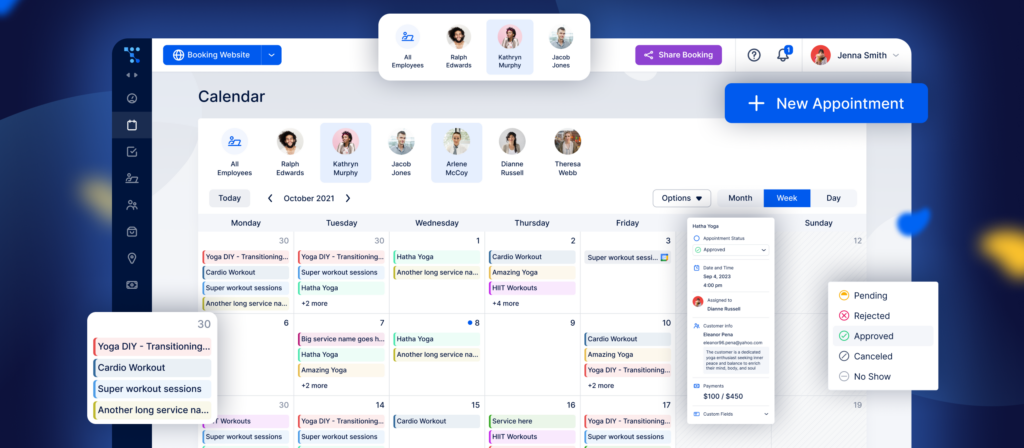Most companies want to improve their performance, engage employees, strengthen the employee-manager relationship, and build a stronger workforce. But how do they go about this?
By participating in a diverse set of employee development programs. Typically, an employee's professional growth can be achieved through any of these three approaches:
- Coaching
- Mentoring
- Training
It’s quite normal to misinterpret the key differences between coaching, mentoring, and training. This article explains the differences between mentoring, coaching, and training. It also helps you decide which one is best for your career.
What are Coaching, Mentoring, and Training?
What is coaching?

Coaching helps people learn new skills, make changes in their work, and achieve new goals. Coaches help clients to work towards the fulfillment of their personal and career development. At its core, a coaching program differs substantially from a mentoring or training relationship.
In a professional environment, coaching is often interconnected with leadership development. Executives will consider contracting business coaches to achieve their full potential. Employees can benefit from coaching sessions with CEOs and senior management as executive coaches, especially if they practice transformational leadership.
For coaching relationships to succeed, HR managers and company leaders need to check in often with employees in ways that establish a solid company culture and promote its goals.
What makes for a productive leader-as-coach?
They highlight solutions rather than emphasize problems, encourage the team instead of passing judgment, and establish the foundation for professional development rather than barking out orders.
But coaching is not counseling. From time to time, a coaching client may require specialized assistance and information in dealing with certain issues. A good coach will figure out when such issues exceed their skill set or the role and purpose of coaching. A responsible coach will advise learners to seek out either external or internal support and expertise.
Coaching focuses on personal and professional development. For example, there are various types of coaching such as life coaches or coaches who are dedicated to fitness and nutrition. You can also make money as a coach if you develop a winning business model and understand how to successfully set it up.
In summary
Emphasis/Focus
- Elaborate on current skills
- Generate confidence
- Long-range focus and input
- Examine ”how” to accomplish something
- Improve on the person, not the skill
Relationship
- Lengthy, more transformative
- Four to six sessions for one to two hours
- Ownership of actions lies with the learner
Approaches
- Trainee is adept
- Client has specialist knowledge
- Questions and exploration by the coach
- Centered on metaphors, experience, opportunities, and strategies
Outcomes
- Further implementation of skills
- Further attention is paid to behaviors and effect
- Additional possibilities for procedures
- Procedure plans are regularly available
- Boost in confidence
Certification
- Specific, specialized training and certification in coaching programs are generally required for anyone wanting to develop coaching skills that will help others reach their objectives, either personal or career-based. You can get certifications from the International Coach Federation or similar organizations.
What Is Mentoring?

With mentoring, both participants are in it for the long haul. Mentoring relationships rely on respect, trust, and an aspiration to acquire the knowledge to guide them toward realizing their professional goals.
Mentoring is a knowledge-tiered relationship whereby the mentee benefits from engaging with an exceptionally experienced person in their field. The mentoring relationship offers direction and career-based instructions for the “greener” mentee, so they are paired with a mentor who has a lot to offer them when it comes to business know-how.
Try to look at the knowledgeable mentor as more of an experienced colleague rather than an industry old-timer. A mentoring program is all about helping the mentees to develop and improve in their careers through a mentor’s guidance, advice, and support. That’s why mentors must be experienced in their areas of expertise.
Coaching vs. mentoring: What's the difference?
Coaching focuses on improving specific skills or achieving goals through guided practice and feedback, typically in a structured, short-term relationship. Mentoring, on the other hand, involves long-term guidance and support, often focusing on broader personal and professional development through shared experiences.
In summary
Emphasis/Focus
- Mentor imparts their know-how to the learner
- Highlighting a longer, development-focused relationship
Relationship
- Long-term relationship
- Can turn into a lifelong alliance
- Transformative
- Ownership with mentee
Approaches
- Mentor is adept
- Mentee guided by a mentor
- Questions and exploration by mentor
- Focused on experience
- The program develops and advances with time
Outcomes
- A greater understanding of the direction in both career and private life
- Increased self-realization
- Mentee-led plan
- Boost in confidence
Certification
In general, mentorship does not need formal training: it’s a regular transfer of knowledge. It aims to transmit certain skills and expert knowledge from an experienced individual to others to implement in their career.
What Is Training?

Unlike coaching and mentoring, training involves simply relying knowledge that can upskill or multi-skill you or your labor force.
If you’re looking to expand on a skill set or knowledge base, then you upskill. If your goal is to train employees to perform in new or related work areas, then you multi-skill. This further develops employees’ effectiveness and work performance in the company.
Training is very much a team-oriented and people development process with hardly any time spent one-on-one. This boasts some positive outcomes, since training and development encourage camaraderie, and develop interpersonal skills and a sense of responsibility toward the business.
The trainer needs to boast more knowledge and specific skills than the trainee. They’re the expert in their field who has all the right answers and solutions. The learning experience flows in one direction: from the trainer to the trainee.
The employee learns to bridge the gap between their current skills and the skills required to fulfill a specific role. This has a twofold reward: positive financial results and job satisfaction, as well as a boost in employees’ overall well-being.
Employees are more stimulated and inspired and therefore remain loyal to the company longer than those who haven’t been trained in such skills. There are both intrinsic and extrinsic advantages to training the team, as you can see in the above chart.
As an illustration: Assume you’re an average cook. You want to improve, and so you enroll for a few training classes on the weekend. There is no doubt that such classes will help you to acquire a great deal of information in a short period. But these skills are not consistently reinforced; it’s up to you and the others to apply whatever training and new skills you’ve acquired.
If it isn’t promptly applied, such knowledge and skills fade—in other words, use it or lose it.
In summary
Emphasis/Focus
- Expand on new skills
- Brief focus and input
- Revive old skills
- Technical or “soft” focus
Relationship
- Very transactional
- Temporary, not many days
- “Tutor and pupil” setup
- Ownership lies with the trainer who communicates their skills and know-how
Approaches
- Trainer as adept
- Specialized knowledge
- Trainer-driven
- Activities, roleplay, discussions, exercises
- Assistance is offered mainly at the time of the training program
- Specific goals described at the beginning of the program and coaching intervention to help them achieve their goals
Outcomes
- Enhanced skill set
- Boost in self-confidence when applying skills
- Plan for application of skills not always set up
Certification
- No comprehensive certification or instruction is required. An individual or program is searching for duplication or comprehension of the various methods applied to get a specific result
Get an All-in-One Tool for Your Coaching, Mentoring, or Training Business
Whether you're diving into coaching, mentoring, or training, Trafft is your ultimate partner for efficient appointment scheduling and more.
Picture a tool that adapts to your unique needs, providing a user-friendly experience for both you and your clients.
As a coach, effortlessly manage sessions and set development goals with precision. If you're on the mentoring path, use Trafft to streamline the process of guiding mentees toward their long-term success. As a trainer, maximize your efficiency by effortlessly coordinating and confirming training sessions.
Trafft is the bridge that connects your passion for development with the practicality of organized scheduling, ensuring you have more time to focus on what truly matters – guiding, mentoring, and training.
Elevate your career in coaching, mentoring, or training with Trafft – the all-in-one appointment scheduling software designed to empower your professional journey.
What can you do with Trafft?
- Effortlessly create high-converting booking websites and optimize repetitive tasks for a seamless user experience.
- Ensure a well-organized schedule with minimal errors, eliminating the risk of no-shows or double bookings.
- Enjoy advanced features such as multi-location scheduling, multi-language capabilities, recurring appointments, and group bookings.
- Benefit from easy rescheduling, appointment reminders, and highly customizable booking forms with templates.
- Leverage powerful integrations with MailChimp, Google Analytics, Stripe, PayPal, and Zapier for enhanced functionality.
- Seamlessly schedule virtual meetings with native integrations with Zoom, MS Teams and Google Meet.
- Access insightful business dashboards for data-driven decision-making.
- Enhance the customer experience with customer notes and integrated payment processing for timely payments.
- Choose from various sharing options for your booking page, including a QR code, an embeddable form, or a simple link.
- Experience the extra boost in revenue and financial management that Trafft brings to your coaching, mentoring, or training business.
But wait, you haven’t heard the best thing about Trafft, yet.
Trafft is completely free for up to 5 users and believe me, you don’t want to miss out on these amazing features above.
Sign up for free and organize, schedule, and manage your whole business with Trafft.
The Differences & Similarities Between Coaching vs. Mentoring vs. Training
You’ve examined the variations between training, mentoring, and coaching, and you want to consider the best course of action for yourself. Suppose you want to pick up work on one of these specific skills and offer your services. Let’s see the differences and similarities between each to help you pick:
Coaching vs. mentoring
Think of it like this: coaching is about bettering clients’ performance; mentoring is about developing their potential. An effective coach will set clients’ development goals, but a business mentor directs the mentees to establish their own objectives. They illuminate the path for the learner to uncover their own knowledge and learn to be self-sustaining.
Coaches hope to boost how employees apply what they know using stimulating coaching questions and dynamic inquiry. Coaching has a one-of-a-kind approach, as it highlights fresher and more effective methods of leadership, work, and life. Mentors and trainers are presumed to be masters in their fields.
They impart their own experiences or train clients in a particular skill or process. In a nutshell, a mentor or trainer qualifies your skill set and is performance-driven, while a coach is development-driven, as they aim to guide and motivate clients in the right direction.
Undoubtedly, while both training and mentoring promote practical learning and development resources, coaching can alter a person’s behavior for the better. It helps clients determine how to take advantage of their high potential, it produces beneficial activity, reflection, and results that become noticeable to others. They then wonder, “Could I improve myself with a coach?” The answer is consistent and confident: yes!
How mentoring is different from coaching?
Mentoring is typically a longer-term relationship focused on the overall performance of an individual. It involves guidance, advice, and sharing of experiences. Coaching, on the other hand, tends to be more short-term and development-oriented, aiming to improve specific skills.
What is the difference between leadership coaching and mentoring?
Leadership coaching often concentrates on enhancing specific leadership skills or addressing leadership challenges. Mentoring in leadership might involve a more experienced leader guiding a less experienced one in their career development and overall growth.
What are the similarities between coaching and mentoring?
Coaching and mentoring exhibit several similarities, emphasizing a supportive and developmental relationship. Both involve a more experienced individual guiding and assisting someone with less experience.
In both coaching and mentoring, there is an emphasis on fostering personal and professional growth. They provide a platform for feedback, encouragement, and skill enhancement.
Additionally, both coaching and mentoring relationships often aim to help individuals achieve specific goals and overcome challenges by offering insights and constructive guidance. Despite these similarities, coaching typically focuses on short-term skill development and performance improvement, while mentoring tends to have a longer-term, relationship-driven approach with a broader developmental scope.
Coaching vs. training
Training works when your organization has to check boxes when it comes to PII (Personal Identifying Information) or HIPAA (Health Insurance Portability and Accountability Act) Compliance. It is restricted by its range and comprehension of the basics. For the most part, training supports you in developing a particular skill during a brief period. Coaching takes longer, while mentoring can involve years.
What are the similarities between coaching and training?
Coaching and training share similarities in their goal-oriented, skill-development approach, providing personalized guidance, and feedback, and fostering continuous improvement. Both methods aim to enhance individual capabilities and achieve specific objectives.
However, training tends to be more structured, focusing on specific skills, while coaching is often holistic, addressing broader aspects of personal and professional development.
Mentoring vs. training
Mentoring and training, much like coaching, play distinct roles in fostering professional growth.
When it comes to mentoring, the focus lies on giving knowledge and guiding individuals on a path already traversed by the mentor. It emphasizes long-term success and a holistic view, allowing mentees to develop their potential.
On the other hand, training is performance-driven but with a more structured and skill-specific approach. Trainers are perceived as masters in their fields, sharing experiences and instructing in particular skills or processes. Training qualifies skill sets and is more focused on immediate performance.
In essence, a mentor or trainer guides your skill set, and both mentoring and training contribute to practical learning.
What are the similarities between mentoring and training?
Mentoring and training share similarities in their focus on skill development and knowledge transfer. Both involve a more experienced individual guiding and imparting knowledge to someone less experienced. Additionally, both mentoring and training aim to enhance the mentee's or trainee's performance and capabilities.
They often involve personalized guidance, feedback, and a goal-oriented approach. However, mentoring typically takes on a more holistic, relationship-driven dynamic, emphasizing long-term development and personal growth, whereas training is often more task-oriented and focused on specific skills or competencies.
FAQs About the Differences Between Coaching, Mentoring & Training
1. Can a mentor also be a coach?
Yes, a mentor can also take on a coaching role. While mentoring involves sharing wisdom and experiences, coaching focuses on helping individuals discover their solutions. A mentor can incorporate coaching techniques to empower mentees to find their answers.
2. Why is coaching better than mentoring?
It's not necessarily that coaching is better than mentoring or vice versa. The choice depends on the individual's needs. Coaching might be preferred when specific skill development or immediate performance improvement is the goal, whereas mentoring is valuable for overall personal and professional growth.
3. What are 3 key differences between coaching and mentoring?
- Duration and Focus: Coaching is often short-term and task-oriented, while mentoring tends to be a longer-term relationship focused on overall development.
- Role of the Mentor/Coach: A mentor shares experiences and provides guidance, while a coach facilitates self-discovery and skill improvement.
- Scope: Coaching is typically more specific, addressing particular challenges, whereas mentoring covers a broader range of topics.
4. Is mentoring almost similar to coaching?
While there are similarities, such as providing guidance and support, the main difference lies in the scope and focus. Mentoring is broader and more holistic, encompassing personal and professional development, while coaching tends to be more specific and task-oriented.
5. Can I be a coach and mentor at the same time?
Absolutely! Many individuals naturally integrate coaching and mentoring skills. This approach allows you to provide both specific guidance and overarching support, depending on the needs of the person you're working with.
6. What is the difference between coaching and mentoring facilitation?
Coaching facilitation involves guiding individuals through a process to reach specific goals or outcomes. Mentoring facilitation, on the other hand, may involve creating an environment for the mentee to explore their own path with the mentor providing guidance and insights.
7. What is the difference between coaching and mentoring models?
Coaching models often follow a structured process aimed at achieving specific objectives. Mentoring models may be more flexible, adapting to the mentee's needs over time, and often involve a relationship-building aspect.
8. Can someone be both a mentor and a coach at the same time?
Certainly, a person can serve in both capacities simultaneously. Nonetheless, it's critical to recognize the distinctions between the two roles and know which one is appropriate for a given circumstance.
If a mentor also serves as a coach, they should be clear about when they are giving counsel and when they are assisting someone reach a certain objective.
9. How do mentoring and coaching differ in terms of goals and objectives?
Whereas coaching focuses on certain goals and objectives, mentoring is more concerned with the long-term growth of the individual. In order to help someone grow through time, mentoring involves offering advice, moral support, and the sharing of experiences.
By concentrating on specific abilities or areas for improvement, coaching, on the other hand, aims to assist someone in achieving specified goals in a shorter amount of time.
10. Which approach is more suitable for personal development: mentoring or coaching?
Depending on the requirements and objectives of the individual, both mentoring and coaching can be successful for personal growth.
While coaching can be excellent for those who need assistance in improving certain abilities or accomplishing specific goals, mentoring can be particularly helpful for people who are searching for direction and advice in their professional or personal lives.
11. How do mentoring and coaching differ in terms of the level of formality?
With a focus on developing a relationship between the mentor and mentee, mentoring is typically more casual. In general, coaching is more formal, with scheduled sessions and an emphasis on particular goals and objectives.
The formality, however, can differ based on the circumstance and the demands of the individual.
12. Can a coach be a mentor to their clients, or is it better to keep the roles separate?
The tasks and responsibilities of a coach and a mentor for their customers should be clearly defined. When serving as a mentor, the emphasis should be on exchanging experiences and offering advice, however when coaching, the emphasis should be on certain aims and objectives.
Separating the responsibilities helps make things clearer and ensures that both strategies work.
13. What are some specific skills and techniques used in coaching, compared to mentoring?
Goal-setting, action planning, and accountability are just a few of the specific strategies and abilities that coaching frequently focuses on.
Contrarily, mentoring is usually more concerned with establishing a rapport, exchanging stories, and offering counsel and direction. Similar techniques may be used by both strategies, but their focuses and accents differ.
14. How does the length of the relationship differ between mentoring and coaching?
Coaching connections are typically more transient than mentoring ties, which tend to be lengthier. While coaching is concentrated on reaching specific goals or objectives in a shorter amount of time, mentoring entails establishing a connection over time.
The duration of the connection might, however, change based on the requirements and objectives of the individual.
15. Which approach is more effective for career development: mentoring or coaching?
Depending on the needs and objectives of the individual, both mentoring and coaching can be useful for career growth.
While coaching can be effective for those who require assistance in improving specific abilities or reaching specific career goals, mentoring can be particularly helpful for people searching for direction and advice on their career path.
16. What are some best practices for finding a mentor or coach?
Determining your goals and objectives, looking for referrals or recommendations, researching possible mentors or coaches, being explicit about your expectations and needs, and setting clear limits and expectations for the relationship are some best practices for choosing a mentor or coach.
Finding someone with the knowledge, experience, and communication abilities required to be an effective mentor or coach is also crucial.
With a mentor or coach, you need to establish open lines of communication, trust, and a desire to learn and develop.
Mentoring vs. Coaching vs. Training: A Journey in Development
If we appreciate the differences in these various development approaches, we’ll be able to determine the best fit in helping others to achieve their full professional potential. But don’t underestimate the value of flexibility and adaptability of each role, whether it’s mentoring vs. coaching or the benefits of specialized training. Take into consideration who, when, and what is required on the development journey.
You may adopt a coaching, mentoring, or training style, but there’s always one fundamental principle to keep in mind—respect the individual and their development path. Understand and value their individuality as you continue to shape and promote improvement in their way of thinking.



![White Label Software: Top Picks + In-Depth Reviews [2025]](https://trafft.com/wp-content/uploads/2024/02/white-label-software.png)



